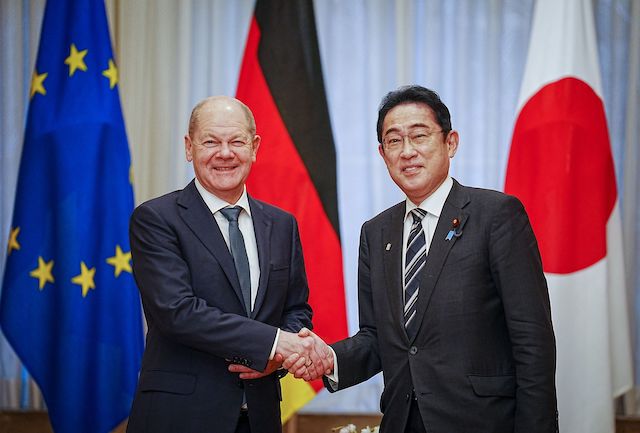Admin l Saturday, March 18, 2023
Germany, Japan to parley on defence

BERLIN – Germany and Japan plan closer cooperation in defence and the supply of key raw materials, the leaders of the two nations agreed during their first government consultations in Tokyo on Saturday.
Next year, the German Armed Forces will again send a ship to the Pacific, which will dock in Japan, said German Chancellor Olaf Scholz, who called the mission a “commitment to freedom of the seas.”
Scholz, Japanese Prime Minister Fumio Kishida and several ministers met in Tokyo for talks are focusing on international cooperation, as Berlin seeks to reduce its economic dependence on Chinese raw materials amid global supply chain tensions.
Tokyo and Berlin also plan to better protect and promote new technologies to manage risks to global supply chains, particularly in strategic areas such as minerals, semiconductors and hydrogen, according to a joint statement.
Both sides aim to address and contain the risk of excessive dependencies, the statement says, with national institutes due to expand their cooperation and for further governmental support for extraction, refining, processing and recycling.
Scholz paid tribute to the knowledge amassed on both sides and said united, these could “lead to a significant increase in the scope for action.”
He said a shared outlook was emerging in terms of where investments in raw materials exploration could take place elsewhere and that companies should cooperate and invest.
For minerals and critical technologies in particular, it is important to maintain supply chains “between like-minded countries,” Kishida said.
At the start of the talks, Kishida said this would take the already close relations between the two countries “to a new level.”
Scholz also spoke of a “sign of very good relations.”
“The intergovernmental consultations will further advance our strategic cooperation, and they are a very important contribution to giving this close cooperation a new boost that we want to achieve together,” he said.
Last year Japan, which also imports raw materials on a large scale, specifically passed a law on economic security, which the German government sees as possible blueprint for its own efforts. A separate ministerial post has also been created for the key issue.
Berlin is trying to diversify and learn lessons from its former dependence on Moscow for gas supplies, which was hastily ended after the Kremlin began its invasion of Ukraine.
Scholz was accompanied by Economy Minister Robert Habeck, Foreign Minister Annalena Baerbock, Finance Minister Christian Lindner, Interior Minister Nancy Faeser, Defence Minister Boris Pistorius and Transport Minister Volker Wissing.
Earlier, Japan’s Economy, Trade and Industry Yasutoshi Nishimura said Japan wants to strengthen economic cooperation with Germany.
“In view of the drastically changed international situation, strengthening strategic cooperation between our two countries, including for shaping the international order, is of great importance,” Nishimura said at the opening of the bilateral consultations.
Alongside developing sources of raw materials, Habeck said climate-neutral energy supplies were a further area for closer cooperation.
“In view of the rapprochement between China and Russia and the division of the global economy, the association of Western countries is all the more important,” Nishimura said.
Germany is Japan’s most important trading partner in Europe, while Japan is Germany’s second largest trading partner in Asia after China.
Scholz’s talks with Kishida were also covered defence issues.
The German Armed Forces had already sent a warship and fighter jets to the Pacific region to strengthen cooperation with friendly forces there. It plans to participate in exercises again this year.
In April last year Scholz chose Japan as his first travel destination in the region. His predecessors Angela Merkel and Gerhard Schröder went to China first.

